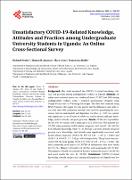| dc.contributor.author | Nyeko, Richard | |
| dc.contributor.author | Amanya, Sharon B. | |
| dc.contributor.author | Aleni, Mary | |
| dc.contributor.author | Akello, Franceska | |
| dc.date.accessioned | 2021-07-29T07:33:47Z | |
| dc.date.available | 2021-07-29T07:33:47Z | |
| dc.date.issued | 2021 | |
| dc.identifier.citation | Nyeko, R., Amanya, S.B., Aleni, M. and Akello, F. (2021) Unsatisfactory COVID-19-Related Knowledge, Attitudes and Practices among Undergraduate University Students in Uganda: An Online Cross-Sectional Survey. Open Journal of Preventive Medicine , 11, 259-277. https://doi.org/10.4236/ojpm.2021.116021 | en_US |
| dc.identifier.issn | 2162-2485 | |
| dc.identifier.issn | 2162-2477 | |
| dc.identifier.uri | https://hdl.handle.net/123456789/305 | |
| dc.description.abstract | Background: This study examined the COVID-19-related knowledge, attitude
and practices among undergraduate students in Uganda. Methods: An
online cross-sectional survey was conducted from 12th-19th June 2020 among
undergraduate students using a standard questionnaire designed using
Google Forms sent via WhatsApp Messenger. The data were analyzed using
SPSS. Pearson’s Chi-square test was used to test the differences and odds ratios
with their 95% confidence intervals were used for quantifying the association
between independent and dependent variables. p < 0.05 was considered
significant. A cut-off score of ≥80% was used to denote sufficient knowledge,
positive attitude, and good practices. Results: Of the 161 respondents,
102 (63.4%) were males with a mean age of 24.2 (5.0) years. The majority 121
(75.2%) were pursuing health-related programs and overall, 110 (68.3%)
had sufficient knowledge while 76 (47.2%) had a positive attitude and good
practice each. Knowledge and attitude were significantly associated with
health-related programs (AOR 4.78, 95% CI 2.06 - 11.07; p < 0.001) and
(AOR 3.18, 95% CI 1.33 - 7.62; p = 0.010) respectively. The practice was associated
with the male gender (AOR 2.37, 95% CI 1.19 - 4.73; p = 0.014). The
most commonly cited sources of COVID-19 information were news media
147 (91.3%), Ministry of Health 134 (83.2%), and social media 125 (77.6%).
The ministry of health was considered the most trustworthy source 139 (86.3%)
and social media the least 21 (13.0%). Conclusions: COVID-19-related
knowledge, attitude and practices among undergraduates in Uganda were low overall. Therefore, concerted efforts to provide tailored health education and
behaviour change communication are needed. | en_US |
| dc.language.iso | en | en_US |
| dc.publisher | Open Journal of Preventive Medicine | en_US |
| dc.subject | Knowledge | en_US |
| dc.subject | Attitude | en_US |
| dc.subject | Practice | en_US |
| dc.subject | COVID-19 | en_US |
| dc.subject | Undergraduate Students | en_US |
| dc.title | Unsatisfactory COVID-19-Related Knowledge, Attitudes and Practices among Undergraduate University Students in Uganda: An Online Cross-Sectional Survey | en_US |
| dc.title.alternative | | en_US |
| dc.type | Article | en_US |

